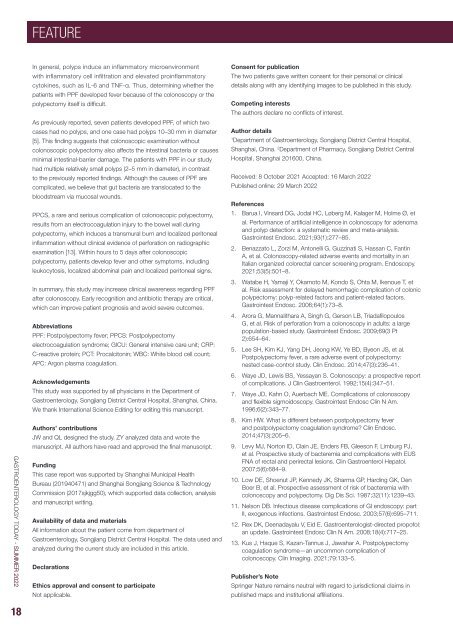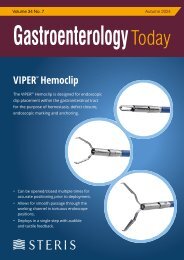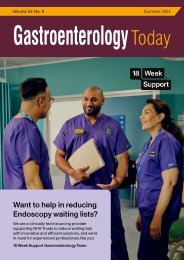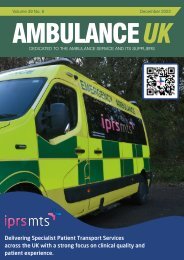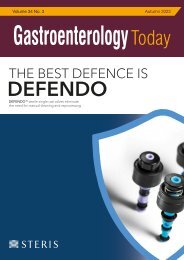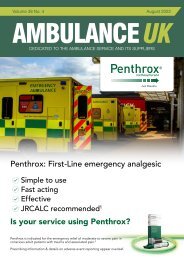Gastroenterology Today Summer 2022
Gastroenterology Today Summer 2022
Gastroenterology Today Summer 2022
You also want an ePaper? Increase the reach of your titles
YUMPU automatically turns print PDFs into web optimized ePapers that Google loves.
FEATURE<br />
GASTROENTEROLOGY TODAY - SUMMER <strong>2022</strong><br />
In general, polyps induce an inflammatory microenvironment<br />
with inflammatory cell infiltration and elevated proinflammatory<br />
cytokines, such as IL-6 and TNF-α. Thus, determining whether the<br />
patients with PPF developed fever because of the colonoscopy or the<br />
polypectomy itself is difficult.<br />
As previously reported, seven patients developed PPF, of which two<br />
cases had no polyps, and one case had polyps 10–30 mm in diameter<br />
[5]. This finding suggests that colonoscopic examination without<br />
colonoscopic polypectomy also affects the intestinal bacteria or causes<br />
minimal intestinal-barrier damage. The patients with PPF in our study<br />
had multiple relatively small polyps (2–5 mm in diameter), in contrast<br />
to the previously reported findings. Although the causes of PPF are<br />
complicated, we believe that gut bacteria are translocated to the<br />
bloodstream via mucosal wounds.<br />
PPCS, a rare and serious complication of colonoscopic polypectomy,<br />
results from an electrocoagulation injury to the bowel wall during<br />
polypectomy, which induces a transmural burn and localized peritoneal<br />
inflammation without clinical evidence of perforation on radiographic<br />
examination [13]. Within hours to 5 days after colonoscopic<br />
polypectomy, patients develop fever and other symptoms, including<br />
leukocytosis, localized abdominal pain and localized peritoneal signs.<br />
In summary, this study may increase clinical awareness regarding PPF<br />
after colonoscopy. Early recognition and antibiotic therapy are critical,<br />
which can improve patient prognosis and avoid severe outcomes.<br />
Abbreviations<br />
PPF: Postpolypectomy fever; PPCS: Postpolypectomy<br />
electrocoagulation syndrome; GICU: General intensive care unit; CRP:<br />
C-reactive protein; PCT: Procalcitonin; WBC: White blood cell count;<br />
APC: Argon plasma coagulation.<br />
Acknowledgements<br />
This study was supported by all physicians in the Department of<br />
<strong>Gastroenterology</strong>, Songjiang District Central Hospital, Shanghai, China.<br />
We thank International Science Editing for editing this manuscript.<br />
Authors’ contributions<br />
JW and QL designed the study. ZY analyzed data and wrote the<br />
manuscript. All authors have read and approved the final manuscript.<br />
Funding<br />
This case report was supported by Shanghai Municipal Health<br />
Bureau (201940471) and Shanghai Songjiang Science & Technology<br />
Commission (2017sjkjgg50), which supported data collection, analysis<br />
and manuscript writing.<br />
Availability of data and materials<br />
All information about the patient come from department of<br />
<strong>Gastroenterology</strong>, Songjiang District Central Hospital. The data used and<br />
analyzed during the current study are included in this article.<br />
Declarations<br />
Ethics approval and consent to participate<br />
Not applicable.<br />
Consent for publication<br />
The two patients gave written consent for their personal or clinical<br />
details along with any identifying images to be published in this study.<br />
Competing interests<br />
The authors declare no conflicts of interest.<br />
Author details<br />
1<br />
Department of <strong>Gastroenterology</strong>, Songjiang District Central Hospital,<br />
Shanghai, China. 2 Department of Pharmacy, Songjiang District Central<br />
Hospital, Shanghai 201600, China.<br />
Received: 8 October 2021 Accepted: 16 March <strong>2022</strong><br />
Published online: 29 March <strong>2022</strong><br />
References<br />
1. Barua I, Vinsard DG, Jodal HC, Løberg M, Kalager M, Holme Ø, et<br />
al. Performance of artificial intelligence in colonoscopy for adenoma<br />
and polyp detection: a systematic review and meta-analysis.<br />
Gastrointest Endosc. 2021;93(1):277–85.<br />
2. Benazzato L, Zorzi M, Antonelli G, Guzzinati S, Hassan C, Fantin<br />
A, et al. Colonoscopy-related adverse events and mortality in an<br />
Italian organized colorectal cancer screening program. Endoscopy.<br />
2021;53(5):501–8.<br />
3. Watabe H, Yamaji Y, Okamoto M, Kondo S, Ohta M, Ikenoue T, et<br />
al. Risk assessment for delayed hemorrhagic complication of colonic<br />
polypectomy: polyp-related factors and patient-related factors.<br />
Gastrointest Endosc. 2006;64(1):73–8.<br />
4. Arora G, Mannalithara A, Singh G, Gerson LB, Triadafilopoulos<br />
G, et al. Risk of perforation from a colonoscopy in adults: a large<br />
population-based study. Gastrointest Endosc. 2009;69(3 Pt<br />
2):654–64.<br />
5. Lee SH, Kim KJ, Yang DH, Jeong KW, Ye BD, Byeon JS, et al.<br />
Postpolypectomy fever, a rare adverse event of polypectomy:<br />
nested case-control study. Clin Endosc. 2014;47(3):236–41.<br />
6. Waye JD, Lewis BS, Yessayan S. Colonoscopy: a prospective report<br />
of complications. J Clin Gastroenterol. 1992;15(4):347–51.<br />
7. Waye JD, Kahn O, Auerbach ME. Complications of colonoscopy<br />
and flexible sigmoidoscopy. Gastrointest Endosc Clin N Am.<br />
1996;6(2):343–77.<br />
8. Kim HW. What is different between postpolypectomy fever<br />
and postpolypectomy coagulation syndrome? Clin Endosc.<br />
2014;47(3):205–6.<br />
9. Levy MJ, Norton ID, Clain JE, Enders FB, Gleeson F, Limburg PJ,<br />
et al. Prospective study of bacteremia and complications with EUS<br />
FNA of rectal and perirectal lesions. Clin Gastroenterol Hepatol.<br />
2007;5(6):684–9.<br />
10. Low DE, Shoenut JP, Kennedy JK, Sharma GP, Harding GK, Den<br />
Boer B, et al. Prospective assessment of risk of bacteremia with<br />
colonoscopy and polypectomy. Dig Dis Sci. 1987;32(11):1239–43.<br />
11. Nelson DB. Infectious disease complications of GI endoscopy: part<br />
II, exogenous infections. Gastrointest Endosc. 2003;57(6):695–711.<br />
12. Rex DK, Deenadayalu V, Eid E. Gastroenterologist-directed propofol:<br />
an update. Gastrointest Endosc Clin N Am. 2008;18(4):717–25.<br />
13. Kus J, Haque S, Kazan-Tannus J, Jawahar A. Postpolypectomy<br />
coagulation syndrome—an uncommon complication of<br />
colonoscopy. Clin Imaging. 2021;79:133–5.<br />
Publisher’s Note<br />
Springer Nature remains neutral with regard to jurisdictional claims in<br />
published maps and institutional affiliations.<br />
18


